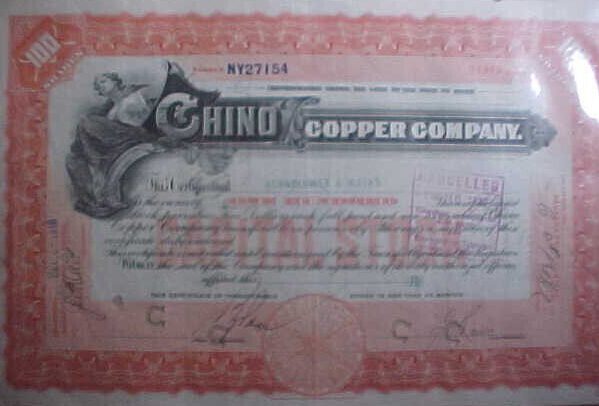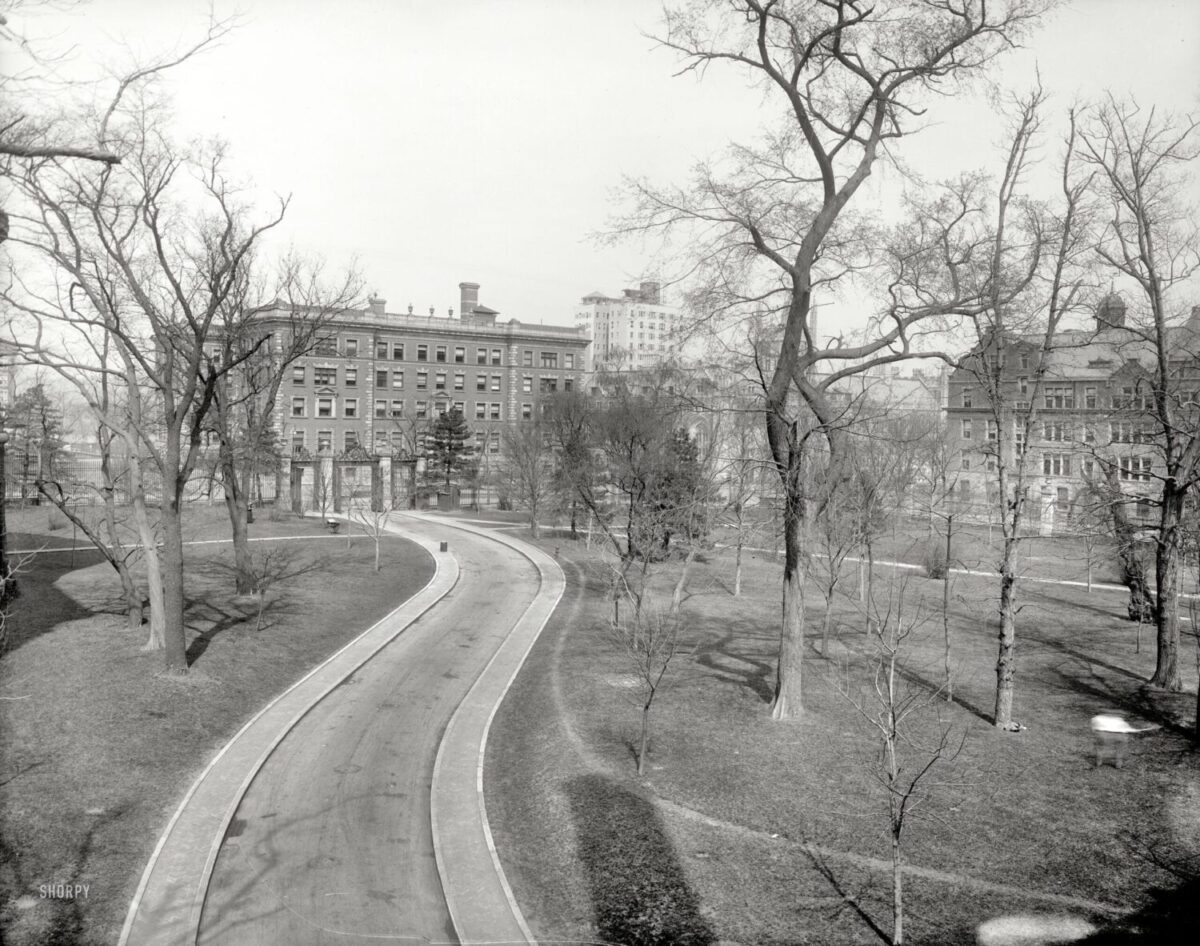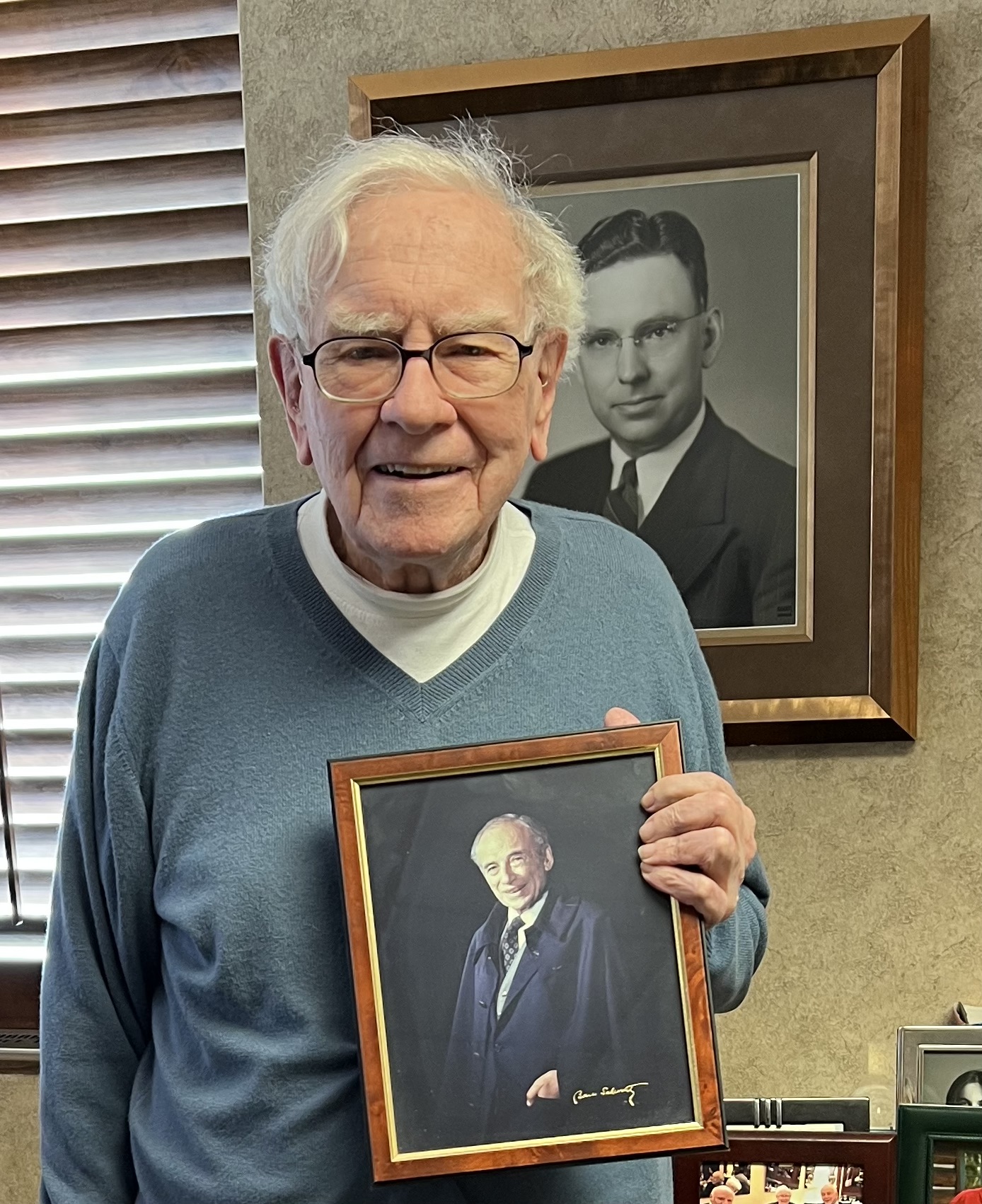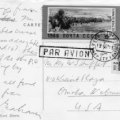Ben Graham hefted his black valise and bade his tearful mother goodbye. In June of 1910, Ben had just graduated third in his class at Brooklyn’s elite Boys High School. He had recently turned sixteen—two years younger than his classmates due to skipped grades. He’d also been elected to the city-wide honor society, Arista, and won a school tennis tournament. Yet he didn’t know if he’d be able to attend college next fall. His father had died eight years before, and his family—his mother, his older brothers Leon and Victor, and Ben—lived on the edge of poverty. Ben Graham needed a full scholarship to fulfill his dream of attending Columbia, the only top college where he could work to support his mother and save money by living at home. He’d taken the exam but wouldn’t find out until summer’s end if he scored high enough to win a Pulitzer Scholarship. Now he had a subway, a ferry, and a train to catch. A summer job on a farm awaited him.
First Night Away from Home
This would be the first time he’d be separated from his family—and tonight would be the first night he slept away from home. He scanned the small top-floor apartment on Kelly Street in the Bronx, gazing fondly at the badly worn Louis XVI chairs and sofa saved from the time when his father was alive, the shelf displaying hand-painted Dresden porcelain. He promised his mother he’d write, and rushed down the stairs.
I’m grateful that my grandfather wrote a fascinating account of this memorable summer of 1910 in his posthumously published autobiography, Benjamin Graham: The Memoirs of the Dean of Wall Street. I draw on that material in this post.
“I was off to New Milford, New York, to work as a summer hired hand, junior grade, on the farm of Mr. Jacob Barman. It had all been arranged by Dr. Weaver, the math professor at Boys High. Beneath his skullcap and acid manner, Weaver was intensely devoted to helping city lads experience the wholesome discipline of life and labor in the country. I had been easily convinced by his eloquence….I had signed up to be a summer apprentice on a farm. The pay: $10 per month and board.”

Pavonia Terminal, the Erie Railroad’s terminal on the Hudson Waterfront in Jersey City, New Jersey
Ben arrived at the Pavonia Terminal, the hub for the Erie Railroad, in plenty of time. He sat down on a waiting room bench and opened the book he’d chosen for summer reading—a translation of the Instauracio Magna, or “Great Instauration” by Francis Bacon. A newer edition of this work published in 2000, The Oxford Francis Bacon, describes the book as “the final completed stages (Parts III-V) of Bacon’s hugely ambitious six-part sequence of philosophical works,” written in Latin from 1620-1626. Ben’s choice couldn’t be farther from The Hound of the Baskervilles or Horatio Alger novels that other boys his age relished. I take the Bacon as a sign that Ben’s spirit rebelled against his teacher’s prescription of “life and labor in the country,” and he had resolved to educate himself, regardless of how much manure he shoveled.
Ben Graham’s ”Stupid Blunder”
Finding his reading “heavy going,” he schlepped over to the window to inquire about the track for the New Milford train. The ticket agent barked: “5:12 on Track 9.” This information conflicted with the farmer’s letter Ben carried in his pocket. The farmer had sent Ben a ticket and instructed him to catch the 4:30 train.
“But I was too bashful to question the agent—a not too agreeable fellow—and so returned to my seat to wait and read some more.”
Awhile later, he feared the agent was wrong. He grabbed his valise and hurried back to the window.
“Then my own stupidity, and the agent’s, too, came to light. Because I had said only “New Milford,” the man had given me the departure time for New Milford, Pennsylvania. That was a much more important town and station than its New York State namesake. Yes, the New Milford, N.Y. train did leave at 4:30 p.m.—in exactly ten seconds.”
Ben dashed to the track. A gate slammed shut in his face, and the train huffed away. The next train left at 5 a.m. Should he go home for dinner and to get some sleep?
“My pride said no. I could not confess my blunder to Mother, nor face the amused sympathy of my brothers, who would be returning from work. It would be more manly, I thought, to wait it out myself.”
Ben Chose to be “Manly”
In all probability this wouldn’t have happened if Ben’s mother had accompanied him to the station, because Dorothy wouldn’t have hesitated to confront the ticket agent, when Ben told her that the farmer had specified the 4:30 train. Most mothers—of any era—would have seen their son off, especially when he’d be gone for the entire summer and had never left home before. Dorothy Grossbaum had no job outside the home; surely her dinner preparations could wait. Still, this was her way. Dorothy’s laissez-faire mothering left her sons to fend for themselves, and left Ben feeling he should handle this, and every problem he faced, alone. Had he not felt the pressure to prove himself a mature man, he would have realized that he could have slept in his own bed and taken a later train the next day. On this night, his capacity to take care of himself would be tested.
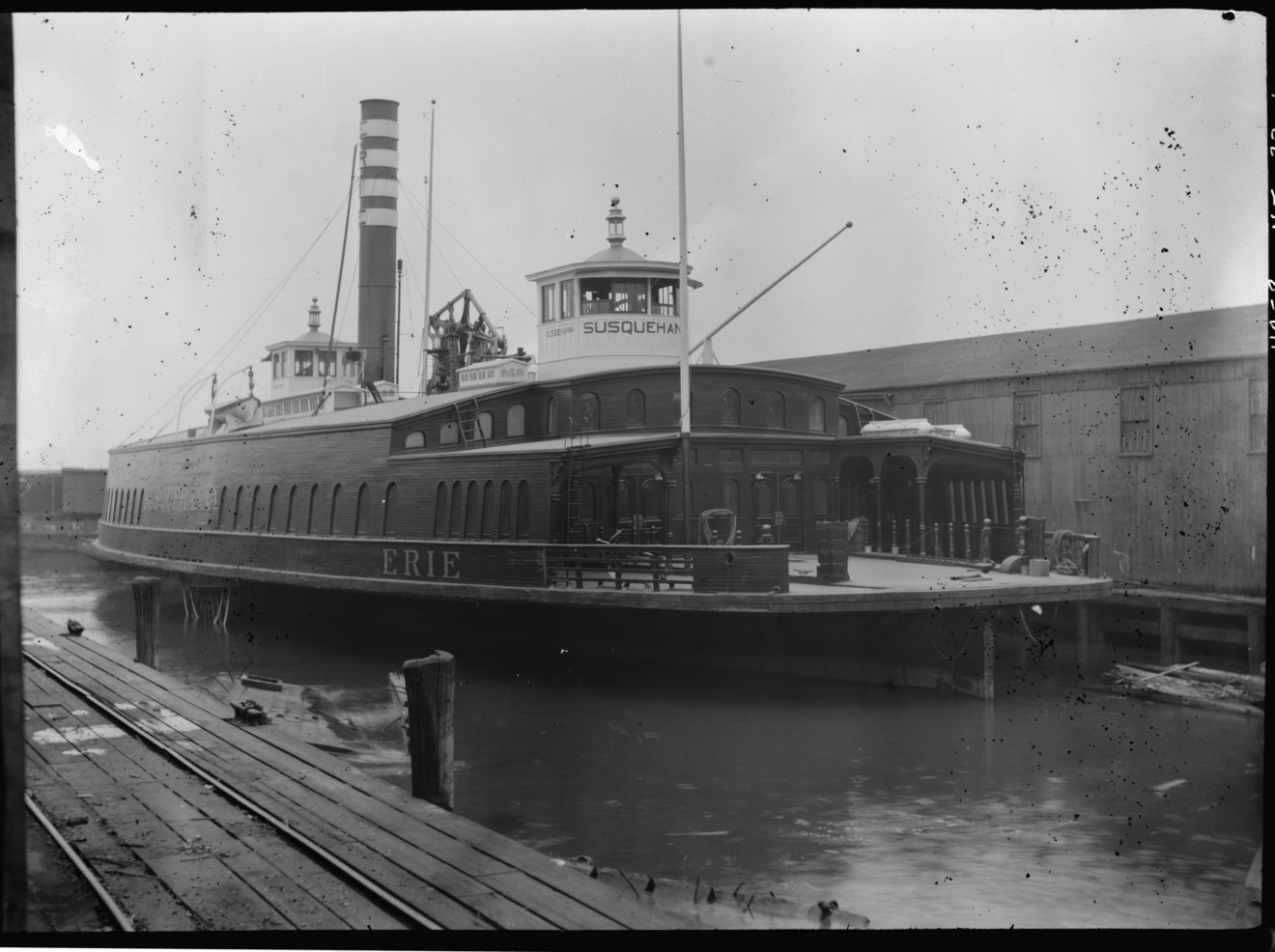
Undated photograph of the Erie-owned ferryboat called “Susquehanna” docked at the Pavonia Terminal
Ben Graham began his lengthy wait by riding the ferry that crossed the Hudson from the Pavonia Terminal in New Jersey to New York, and back again. He was pleased to discover that he could ride to his heart’s content on the single ticket he’d purchased earlier in the day. At first, “the New York skyline, the river traffic, and the mild June air delighted [Ben’s] senses” but “by the tenth crossing, [he] was bored to death.” He ate an inexpensive meal, and went for a walk before selecting a bench in the station and opening the book by Francis Bacon. He had to stay awake for the next eleven hours, or he would likely miss the train. He couldn’t stop thinking about his stupid blunder. Awash in self-criticism, he asked: “How moronic can a man be?” He reminded himself that he was an accomplished student who had sailed through every subject in school. After talking with others who sat for the same scholarship exam, he felt certain he’d done well. His cousin Louis Grossbaum had won a Pulitzer Scholarship and surely Ben had a good chance of winning one, too.
Battle Against Sleep
“At two o’clock in the morning, I faced a new disaster. Suddenly all the lights in the waiting room went off and I was left in utter darkness…I wondered desperately how I could fight off the drowsiness that welled up around my eyes.”
This is not how I’d want a child who is dear to me to spend his first night away from home. He groped in pitch darkness “from one long wall to another” until he happened upon a telephone booth and, inside, discovered a tiny beam of yellow light. He sat hunched in the booth’s cramped seat, his heavy book open, his eyes straining to make out the words in the meager light.
“I was terribly sleepy. Never before had I stayed awake so late, and the effort caused me acute physical pain. Everything impelled me toward slumber. The hour, the strain and exhaustion of the previous day, the surrounding darkness, silence and solitude, the ponderous volume I was reading—all battled against me like an army. But I was determined to stay awake…For I could not miss the train again. That would be too ridiculous.”
Was he able to keep his eyelids open? Did he catch the 5 a.m. train? I promise to answer these questions soon. First, I offer a granddaughter’s perspective.
If Ben Graham Felt Free to Speak His Mind
I don’t believe Ben Graham missed the 4:30 p.m. train because he didn’t want to go to the farm. But I do think he didn’t want to go. He tells us that his high school math professor, Dr. Weaver, persuaded Ben that he would benefit from the “wholesome discipline of life and labor in the country.” But out of all the students at Boys High, only three boys were “easily convinced by [Dr. Weaver’s] eloquence.” Ben, who’d lost his father to cancer, may have subconsciously seen Dr. Weaver as a father figure—an older man who took an interest in him, whose approval he sought. Ben was raised to be a good boy, a boy who took care of his mother and strove to make her happy, a people pleaser who didn’t know his own needs. If Ben had been the sort of boy who felt entitled to do what he—not another powerful person—wanted, he might have stood up to his teacher.
I imagine Ben thanking his teacher for the job offer, and then declaring that he’d much prefer to spend the summer in New York City, where he could earn more than ten dollars a month to help support his family. He’d agree that boys benefit from the discipline of daily labor, but assert that he’d held numerous after-school jobs, including some that required manual labor, such as lugging milk jugs up six flights of stairs and hauling barrels of furnace embers from the cellar to the street. He already possessed a very strong work ethic, and what’s more, he’d learned to be frugal. As Ben explains in the Memoirs:
“The years of poverty since Father’s death…had developed in my character a serious concern for money, a willingness to work hard for small sums, and an extreme conservatism in all my spending habits.”
I envisage Ben telling Dr. Weaver that he planned to study every chance he got. He’d have more free hours to improve his mind in New York than on a farm. That argument might have neutralized Dr. Weaver’s acid expression and even earned Ben a nod of approval.
Thirst for Knowledge
As we see from Ben Graham’s choice of reading material during his solo night at Pavonia Terminal, this boy thirsted for knowledge and devoured challenging literature—more than any teenager I’ve known. He’d rather devote his time to education than entertainment. In 1910, there were no pre-college summer programs of the kind that gifted high school graduates can attend today, often at great expense, at places like Columbia or Yale, Bank of America or the National Institutes of Health. Ben would have relished such a program and benefited from the chance to socialize with peers—something his jam-packed school and work schedule precluded. As things stood, he would toil all summer with no promise of college.
Bashful
My grandfather didn’t muster much enthusiasm for spending the next two months engaged in arduous farm labor. Just as Ben Graham deemed himself “bashful” about challenging the ticket seller regarding the departure time of the New Milford train, Ben was bashful about challenging Dr. Weaver about where he should spend the summer. Ben Graham was bashful in many spheres, a trait he’d need to overcome in order to emerge as the Wall Street innovator we know he became. I find it poignant that, later in his Memoirs, Ben Graham describes himself as “bashful with girls.”
Stay tuned for the next post about Ben’s summer on the farm. You’ll find out how Ben Graham almost learned about sex, discovered the identity of the farm’s mystery resident, and other stories I think you’ll find more engaging than Ben found Francis Bacon’s Instauratio Magna.
Yes. Ben won the fight to stay awake, and boarded the 5 a.m. train.

